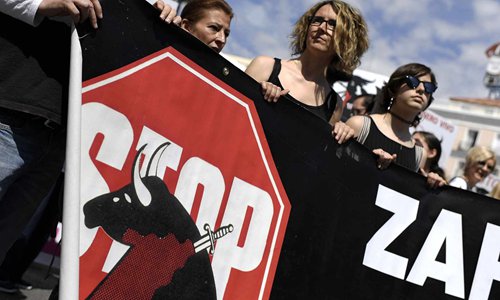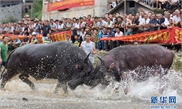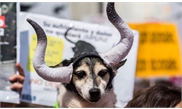
Animal rights supporters also demanded bullfighting to be removed from the country's list of national heritage. Photo:VCG
Colombia's capital Bogota, one of the oldest bullfighting cities in the Americas, is set to outlaw the mistreatment and killing of the animals in a move aimed at eventually banning the events altogether.
The move ratchets up pressure on a spectacle long seen as part of the South American country's cultural heritage, but one slammed as cruel by animal rights campaigners.
Bogota's city council backed a draft law that would prohibit the use of implements that "lacerate, cut, maim, injure, burn or hurt animals in any form whatsoever, as well as putting a bull to death," Andrea Padilla, a Green Alliance Party council member and the bill's promoter, told reporters.
The move would also limit the bullfighting calendar to a maximum of three events per year in the Santamaria arena, which is run by the city hall.
While the power to ban bullfights remains solely with Colombia's legislature, the city council is hoping that removing the goriest part of the spectacle will lead to an eventual end to the blood sport.
Bogota's leftist mayor Claudia Lopez, a member of the Green Alliance Party, said the measures would be promulgated in a few days.
The president of the Bullfighting Corporation of Bogota, Juan Bernardo Caicedo, told reporters the council's move was illegal and "unconstitutional."
He said his organization would use the full power of the courts "to bring all the necessary remedies."
Bullfights have been held in Bogota since 1931, except during a four-year halt imposed under a former leftist mayor, Gustavo Petro, in 2012.
In a 2018 ruling, Colombia's Constitutional Court ruled that bullfighting was part of the country's cultural traditions and exempted the spectacle from animal cruelty laws.
Colombia is one of only eight countries in the world where bullfights are still held, along with Ecuador, France, Mexico, Peru, Portugal, Spain and Venezuela.
AFP



